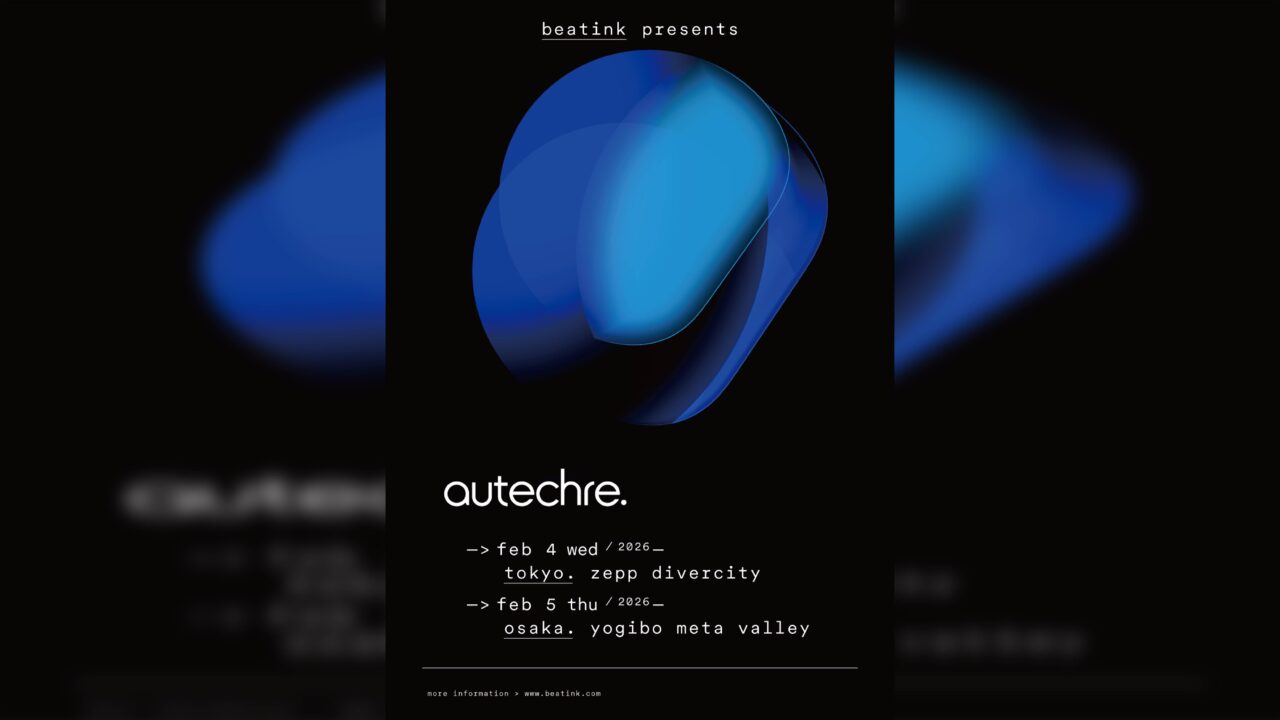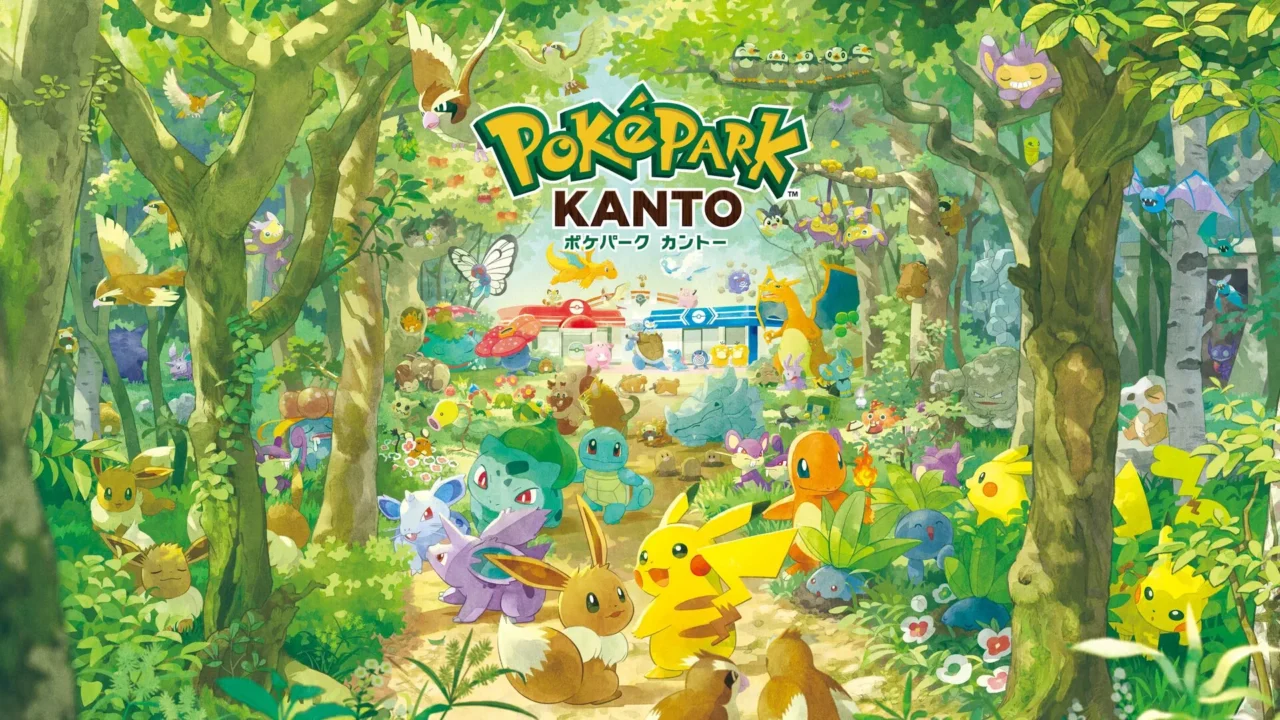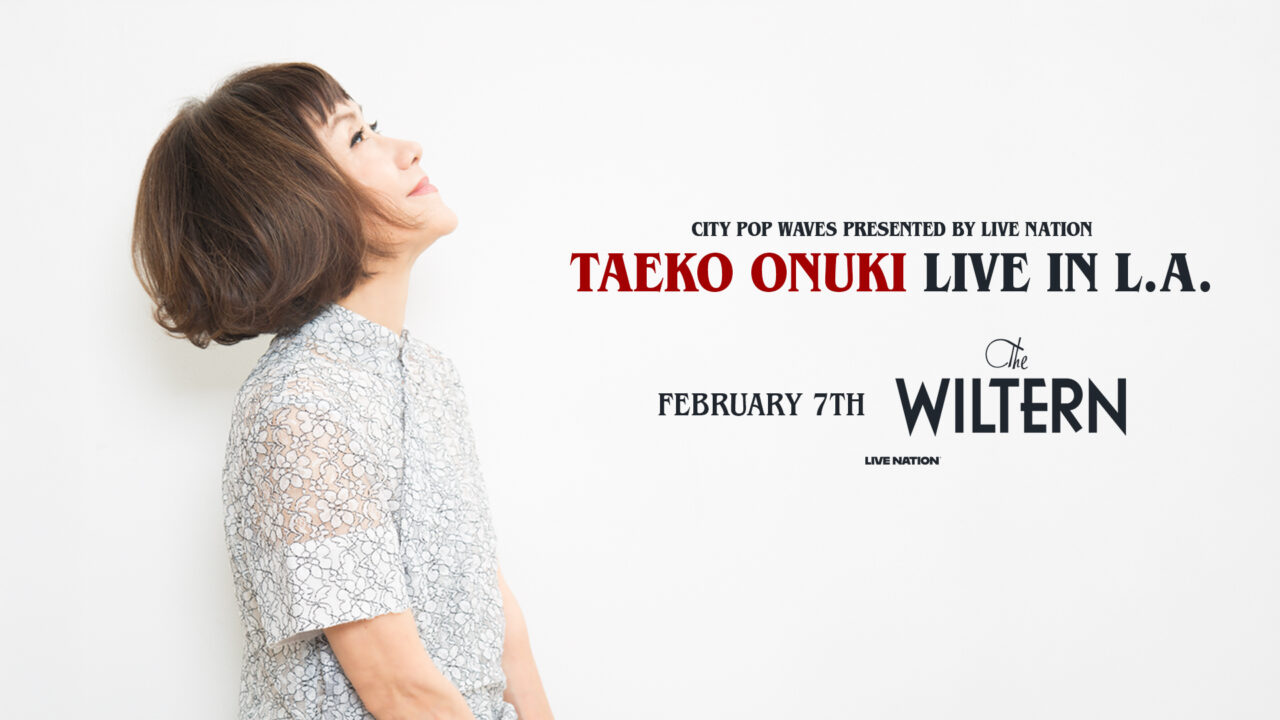The latest EP before you leave from the trio daisansei is a true gem that captivates from start to finish. It’s so beautiful that you’ll want to share it with everyone, whether they’ve heard of the band or not. This collection of six pop songs is filled with raw, fleeting moments that evoke a profound sense of realism and warmth, yet shine with an unexpected brilliance as if discovering a miracle in a brief instant. Each track resonates with the lingering feeling of something lost or the looming sense of an impending loss. Through the passage of time, harsh yet redemptive, the characters in these songs gaze at the void within, remembering what once was and looking forward to what will come to fill it. This music may not cure your boredom or satisfy your hunger, but it will find its way into the weariness and emptiness you carry, offering a quiet companionship. Such moments can’t be replicated by instant gratification; they give you a lasting sense of fulfillment and the strength to keep going.
I had the chance to chat with Nobuaki Ataku (Vocals/Guitar), the composer behind this extraordinary work. While he’s known for crafting music of such beauty, he’s also an interesting character—a band member who once made it to the second round of the M-1 Grand Prix comedy competition. At home, he’s the kind of person who would be alone, solving complex original word puzzles—an eccentric and endearing soul. This interview made me grateful that there are people like him out there.
INDEX
Leaving Behind Writing That Lacks Personal Connection
-I felt that your new EP “before you leave” is like a series of short films, as if we can see a single landscape through the six songs on the EP. What was your own conception of the work?
Ataku: I’ve always longed for an album that feels like a complete album. These days, many albums are just collections of singles, which are more efficient, but when I was a kid listening to music, the excitement I felt was in albums. I knew I had to create something like that someday. That’s why I’m happy with the expression “like a collection of short stories.” Since the songs were all created over the past year, even though each song has its own theme, I think the EP has become a work that has interconnected elements throughout.

Which song was the first to be created for the EP?
Ataku: The first song I completed was the fifth track, “in the cape.” Personally, I really like the sixth track, “Kawatare” (meaning “Who Is This Person”). It allowed me to convey my true feelings, and the melody is great. I thought I would go with the mood of these two songs, but I also wondered if adding something more dazzling might act like the flash of a camera, helping everything else shine. So, I created the title track, “before you leave,” last. This song reflects my real thoughts at 33, including questions like “What would happen if my parents died?”
You mentioned the expression of a camera flash, so it seems like you have a visual image in your mind.
Ataku: It’s always been that way for me. I envision things visually and build them from there. When I write lyrics, I imagine the next scene in my mind and fit the words to it. The visuals always come first for me.

The band “daisansei” was formed in the summer of 2019 when vocalist Nobuaki Ataku began recruiting band members on an online forum, leading to his meeting with Sho Wakiya (Key). They continued with energetic digital releases and, later that year, were joined by Umi Fujikake (Vo/Ba), prompting the band name to be changed to “daisansei.” In November 2020, they released their full album Drama no Day, which garnered attention and was selected as a Tower Records recommendation. With the slogan “A modest, dramatic tribute to ordinary days,” they strive to create pop songs that help reclaim the small, fleeting moments of sparkle that can get lost in everyday life.
Both “Kawatare” and “Before You Leave” have been described as “real,” so did this project often involve blending Ataku’s real-life experiences with the imagery he envisioned?
Ataku: Yes, that’s right. Basically, I try not to write about things I don’t genuinely feel. I have challenged myself to write about emotions and thoughts completely different from my own in an attempt to appeal to a wider audience, but when I think about the fact that there might be someone out there who is deeply connecting with the feelings I wrote just to get sympathy, I realize that would be very disrespectful. For example, if there were lyrics like “Goodbye written on the mirror with lipstick”… whether such a thing exists or not, let’s say it does.
-yes.
Ataku: I couldn’t write that feeling in a real way, but I believe there are people who could write “Goodbye written on the mirror with lipstick” while truly feeling that way. Those people could probably resonate with others. With that in mind, I decided to stop writing about things that have no personal connection to me. In that sense, I’ve always tried to be real, but this time, I wrote about what I was thinking when I asked myself, “What am I thinking right now?” The third song, “Bukettosu,” is a bit of an exception, though.

INDEX
Underlying Sadness in Before You Leave EP
In the midst of such changes, I’d like to ask about the music as well. For example, the song “in the cape,” which was the first track created for this work, begins with the lyrics: “On Route 134, a crushed soda can sways in the salty breeze, clattering.” Route 134 is a national road in the Shonan area, right? It’s written in a very realistic way, so what kind of scenery does this song evoke for you?
Ataku: Since moving to Tokyo, the sea I visit most often is along the Enoden line, around Hase and Yuigahama and places like that. Route 134 runs through that area, and I love the scenery there. I’m originally from Akita, but my family home was near the sea, so I’ve always loved the ocean. “in the cape” is a song I created with a laid-back mindset, so the guitar riff and melody repeat quite simply, while incorporating things I love—like the sea and different landscapes. It has a straightforward, “pale blue scenery” kind of feel. Lately, well… I’ve been feeling lonely. Always lonely. So, I wanted to write about that sense of loneliness.
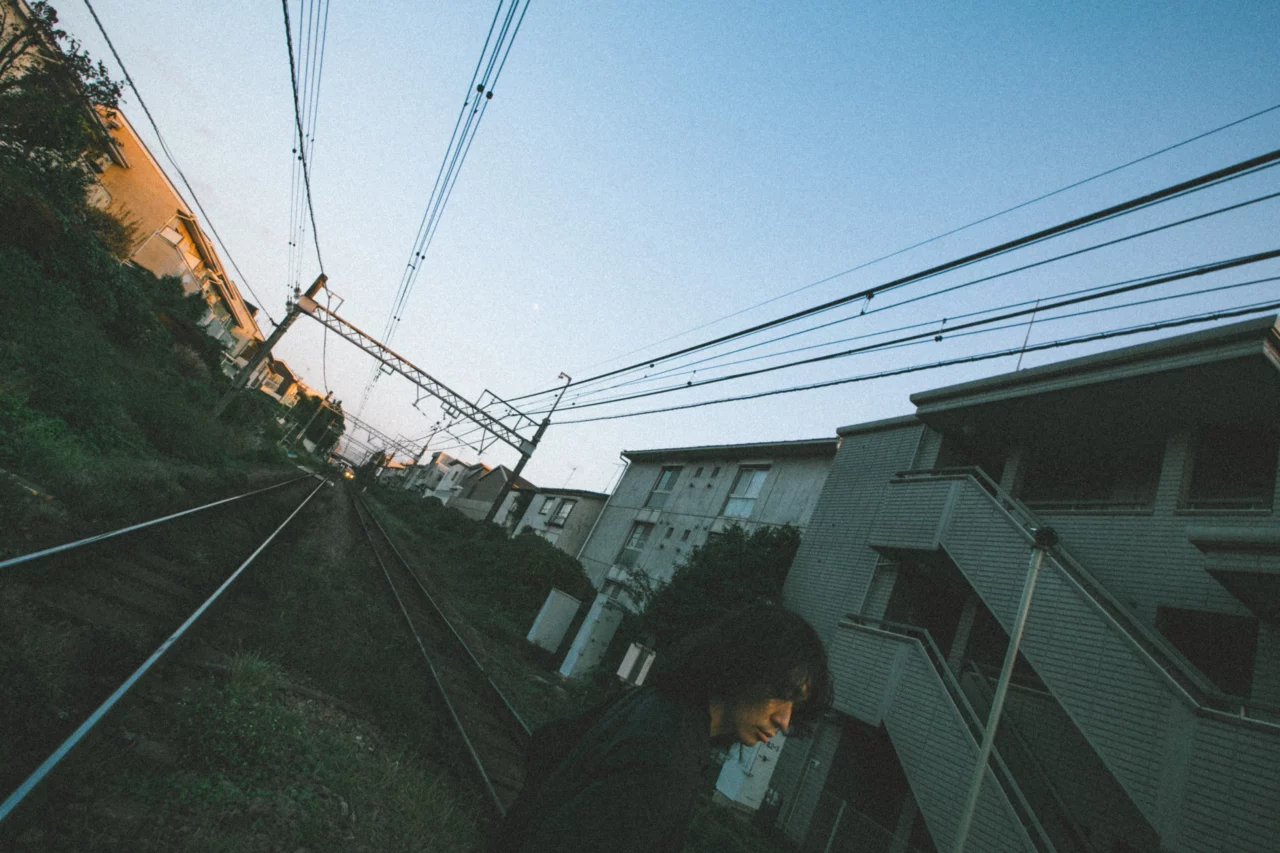
The feeling of “loneliness” seems to permeate the entire before you leave EP. What do you think is the source of that loneliness?
Ataku: I actually figured that out recently. I think this band activity was my first real youth. Before that, I don’t think I truly experienced youth. I wasn’t excited, and it was all quite half-hearted. I started this band in my mid-20s, thinking I might be able to break through that barrier. It was probably the start of my youth, but after about five years, I started to feel like that phase had “officially ended.” The process of struggling to create songs, throwing them to the band, and building them through battles; finding the perfect note for each word we wrote—there was a fire in that, but I think it has flattened out now. On a larger scale, it feels like the end of Chapter 1. I think the loneliness comes after that fire.
-I see.
Ataku: But having that loneliness means, on the flip side, that something has taken root. It means it has become a part of my life. It’s that comfort and calm, but also the sadness of knowing, “the excitement and sparkle from those times have been lost.” And when I think about what to value next, songs about those important things come to mind… In general, that’s the feeling behind this EP.
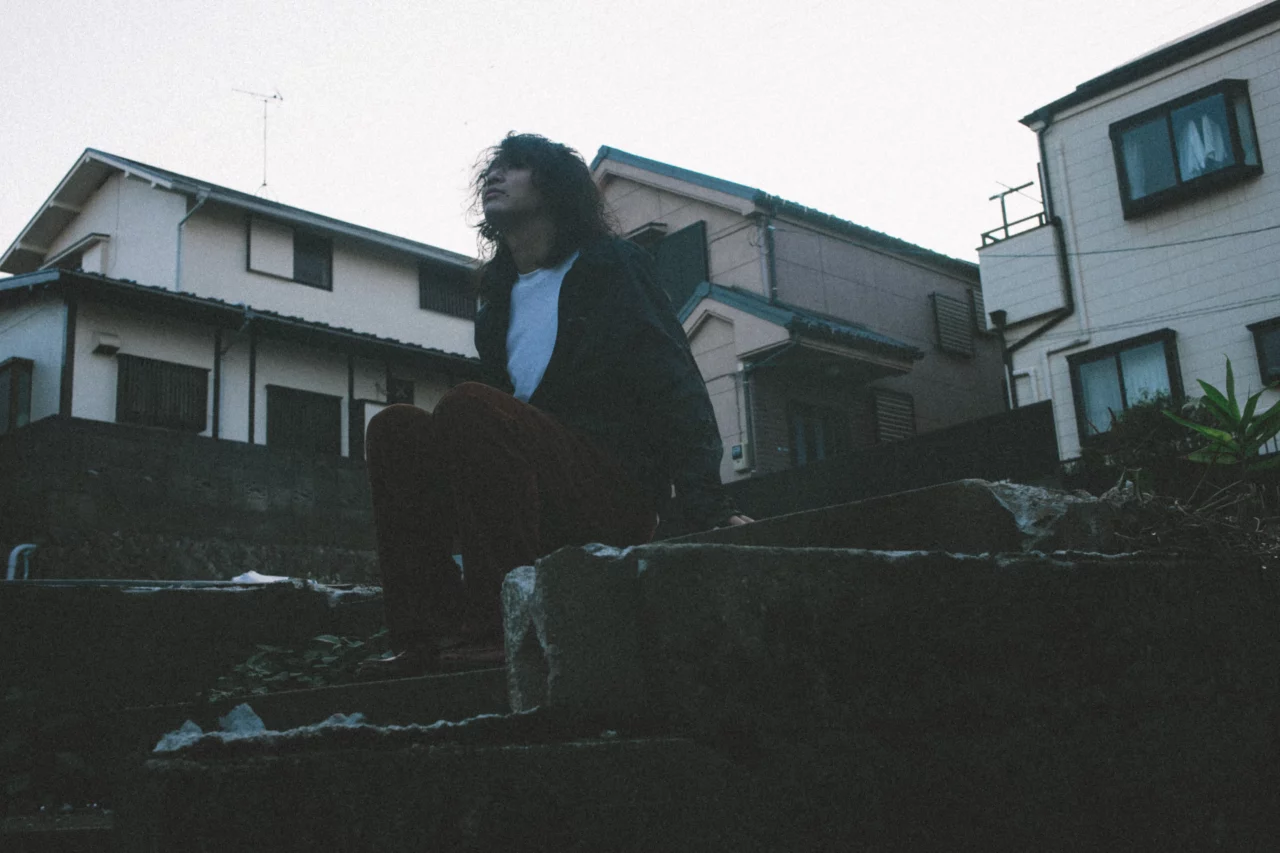
INDEX
A Message for Those Who Overthink the Small Details
When I listened to the before you leave EP, I felt a sense of loss over something that had been lost, but also a lingering feeling that “it was there.” The empty space may eventually be filled, but for now, I’m staring at that space, and there’s a certain fondness for it. It encapsulates a fleeting, intense moment.
Ataku: “Which part are you focusing on?” It’s so real, isn’t it? But I really think that’s how it feels. That “lost thing” isn’t about a specific person or a dramatic event. It’s more about the youth I experienced at the beginning of the band. Back then, my emotions would fluctuate a lot. I’d cry easily, and I’d often run off to the mountains [laughs], but now, I think I’ve become more stable.
Are you catching up with yourself now?
Ataku: This year, I’m 33. When I started daisansei in my mid-20s, I didn’t really feel the changes around me—whether it was aging, appearances, or people disappearing. Even in terms of relationships, I think I felt like I was still in the same space as when I was in middle school. But as I’ve aged, I’ve started noticing things like, “Have my parents really aged this much?” More and more children are being born around me, and I realized, “My niece is already in elementary school,” or “The cousin I thought was still in high school is now a working adult.” These realizations coincided with the end of the first chapter of the band. Maybe I was walking through an incomprehensible tunnel for a long time. And when I decided to come out, I found that the world had changed completely.
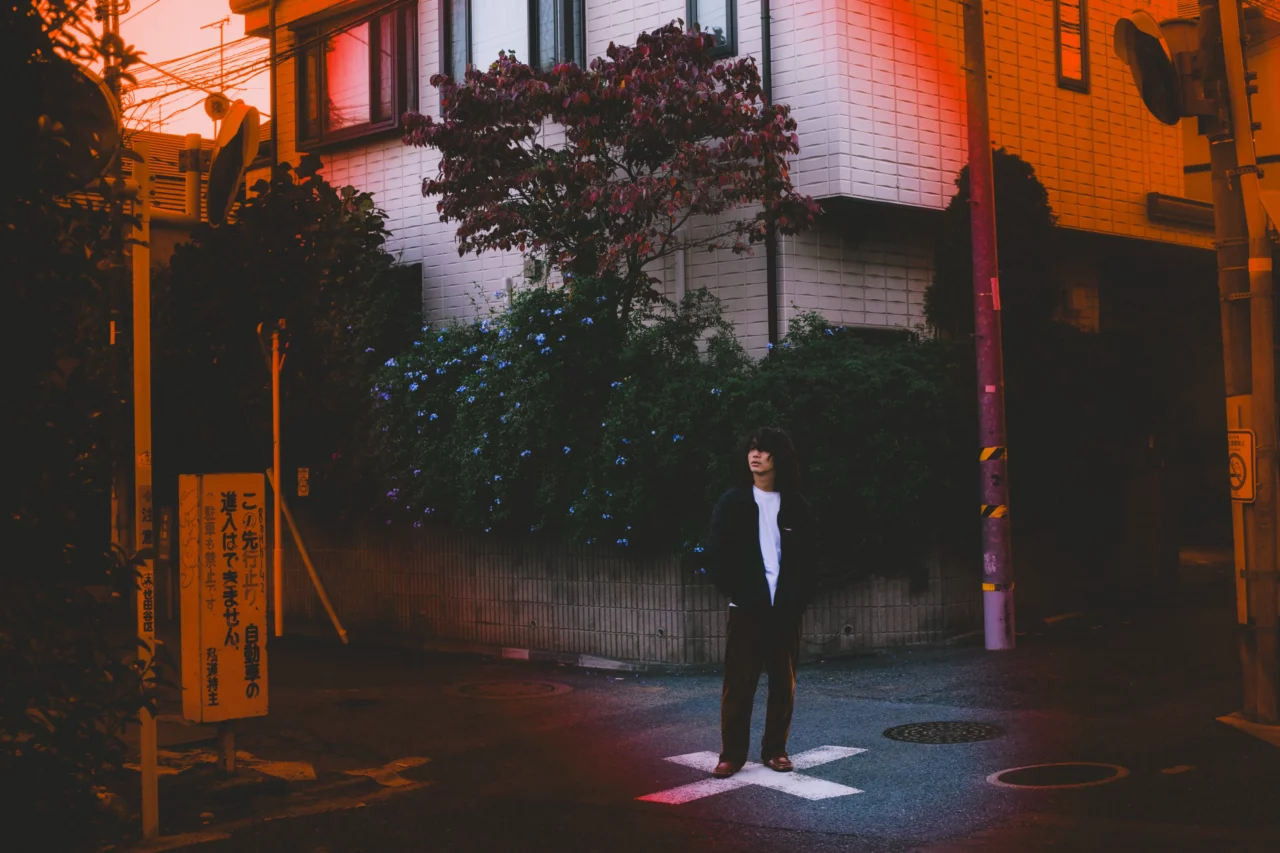
You mentioned earlier, “Which part are you focusing on?” But that means you’re someone who captures those moments and emotions of life, isn’t it, Ataku?
Ataku: Well… it can’t be helped, can it?
-[laughs].
Ataku: Some people are clear and decisive in their reactions—feeling down when something bad happens, getting energized by eating something delicious, enjoying movies with friends, crying at weddings, and so on. But there are also people who overthink things. People who, for no apparent reason, suddenly feel sad, start worrying about something, and fall into a strange zone. I think I’m one of those people. It’s like, “I don’t know why,” you know? It’s embarrassing. As you get older, you’re supposed to stop thinking about these things or learn not to care, but not being able to leave that behind… it’s really hard, you know? What should I do?
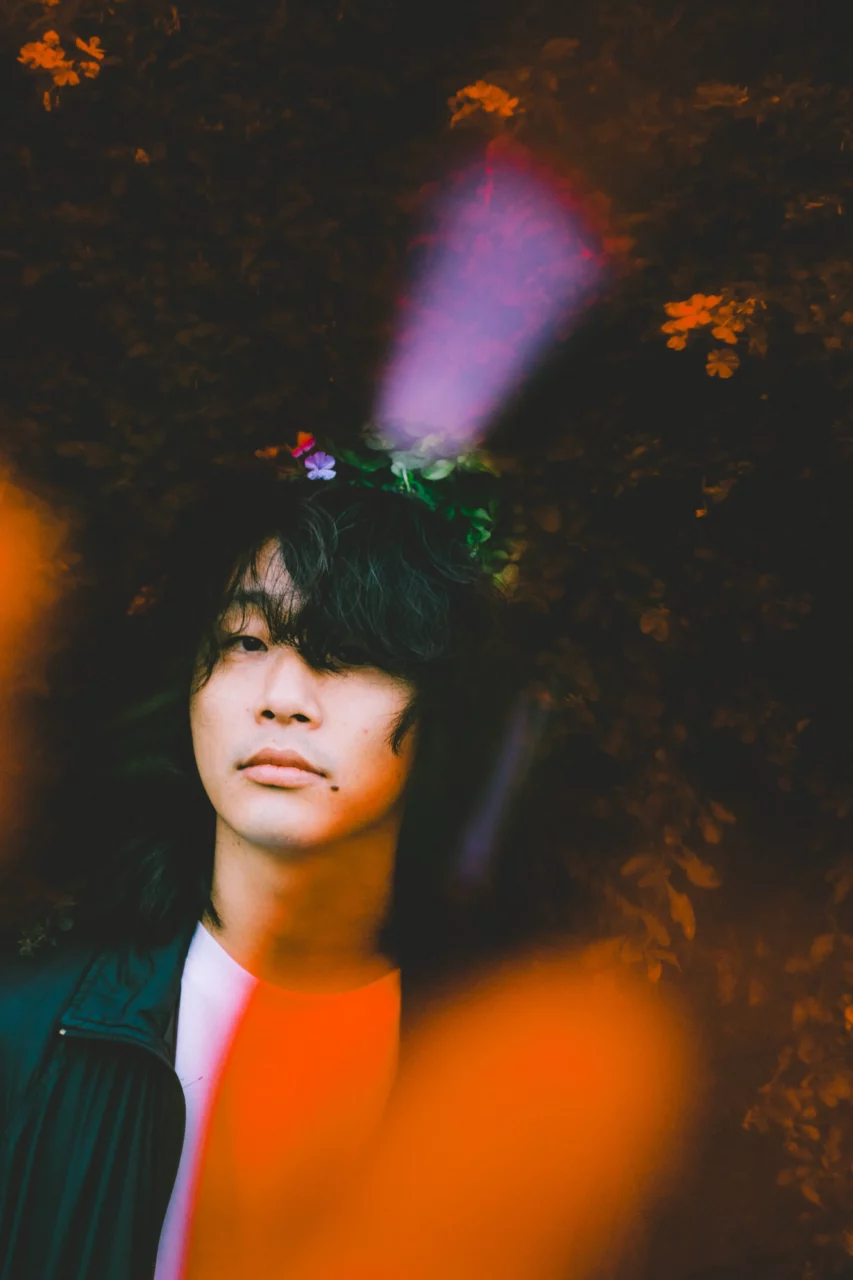
But by thinking and feeling this way and turning those experiences into work, isn’t there something that comes back to you, Ataku?
Ataku: When it comes to creating work, I have to be aware of “what will I think next?” I need to be able to sense that. It helps me confront the idea that “these feelings were real,” and then think, “What will I feel next?” I think that’s an important part of the process.
I want to create things that have an end. Maybe I don’t want things to just drift along. I want to feel like I’ve done as much as I can with a certain theme and then move on… It has to feel like a clear staircase, not just an endless hallway, which would be exhausting.
INDEX
“I Might Just Be an Ordinary Middle-Aged Guy” – Ataku
The sixth track, “Kawatare,” can be interpreted as relating to hometowns and family. What were you thinking when you wrote this song?
Ataku: This song is more about what I want the younger generation to consider. I’d like it to be sung at graduation ceremonies. Usually, you only start to feel grateful to those who raised you after growing up and gaining some life experience, but I hope the younger generation can think about these things earlier.
The idea of “toward the younger generation” is very symbolic. Is the motivation to “share something with someone” something that has emerged for you now?
Ataku: …It’s embarrassing.
-[laughs].
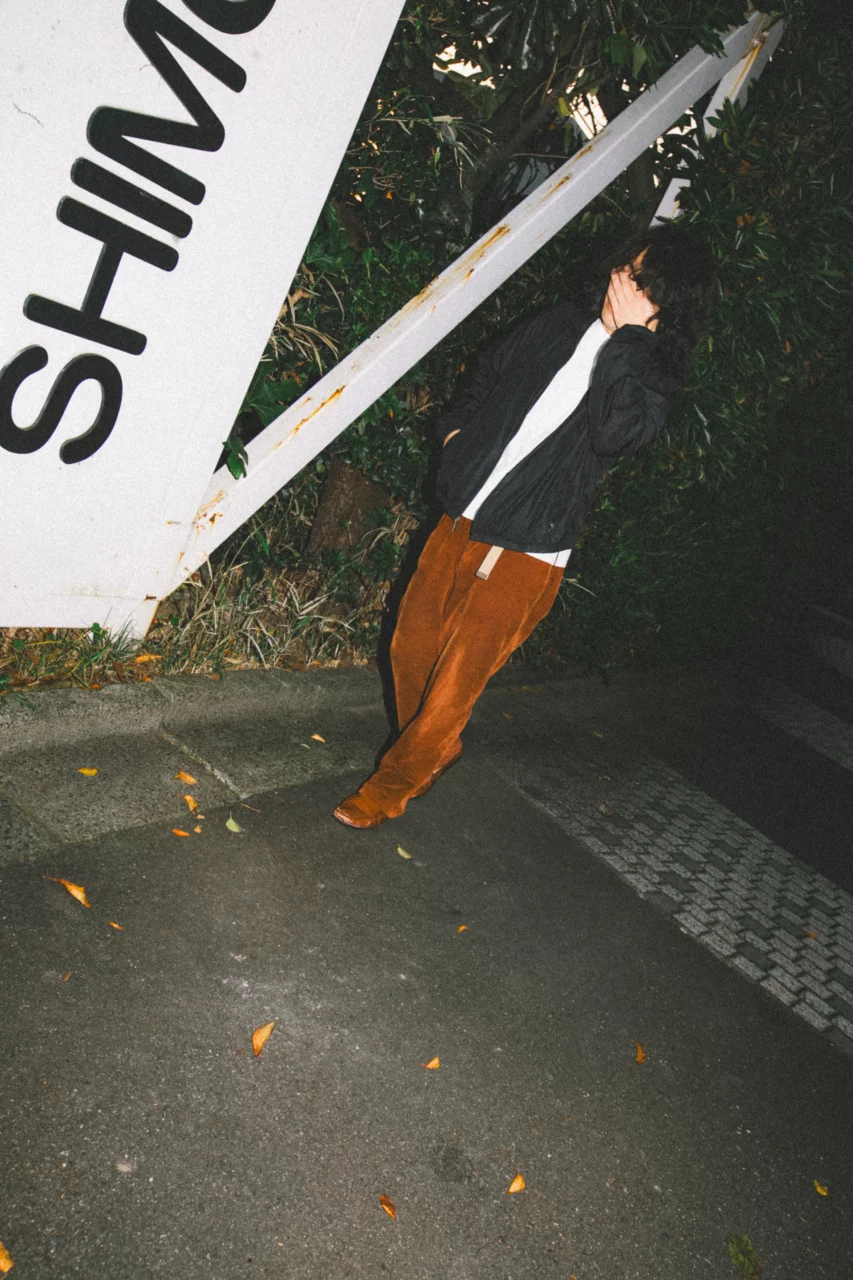
Ataku: I’ve always been making songs that “don’t say anything.” So if this EP is something that actually says something to someone, it’s very embarrassing. Maybe I’ve become an old man. …But there must be something there, right? I feel like I have to say something. It might have something to do with my niece and nephew.
In my hometown in Akita, there’s a small candy store, and there’s a national highway between my house and the store, without any guardrails. I remember crossing that road with my niece and nephew, who were only about 3 or 5 years old, holding their hands and taking them to the candy store on a snowy path. At that moment, I thought, “If something happens to them because of my negligence, they’ll die.” I realized, “I have to protect them to some extent.” Those moments could be significant. The feeling of “I have to say what I can say” might be in me. It’s quite embarrassing.
In the past works of daisansei, this EP feels like the one where you’re trying to say something to others the most.
Ataku: Back then, I was only singing to my former self. So, maybe this is a big change.
After feeling the end of youth, when you think about how to take the next step, the idea of “saying what you can say” seems like it could be a very powerful force.
Ataku: Yes, I definitely think that’s true. But when I really think about it, this is just an ordinary change, isn’t it? Maybe I’m just an ordinary middle-aged guy.
You’re not ordinary, Ataku.
Ataku: That’s true, I’m not ordinary. Alright, alright, alright…
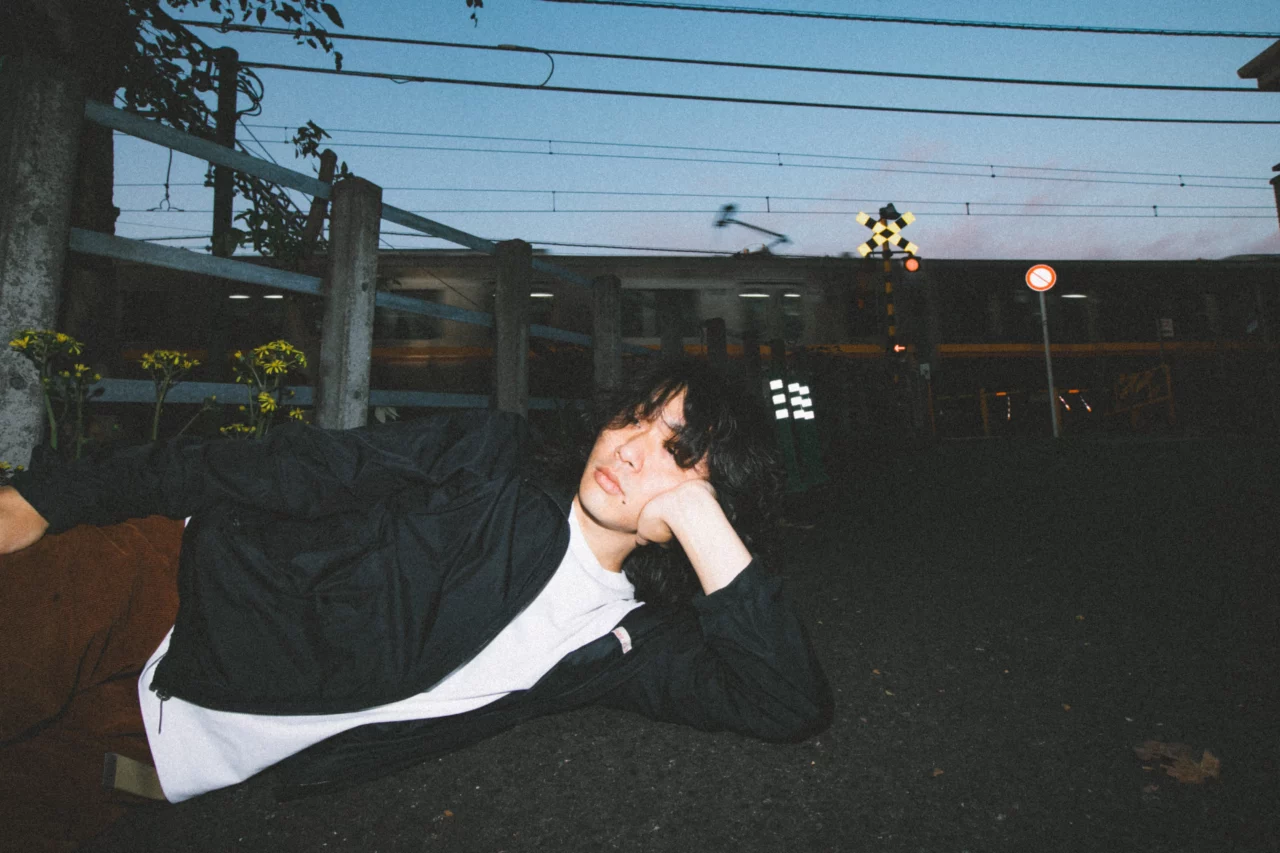
-(laughs).
Ataku: Well, I do think that, in the end, I’m quite ordinary. I thought I would stay the same as I was back in middle school for the rest of my life, but there are parts of me that do change in an ordinary way. There’s both happiness and frustration in that… that’s how it feels.
INDEX
The Challenge of Valuing Many People and the Inexistence of Stories Beyond One-on-One Connections
I think this EP portrays scenes where someone is calling out to someone close by or someone within their heart. Why do you think the lyrics you write often become stories of “people and people”?
Ataku: I don’t really understand anything beyond that. If I were to be self-aware, I think it would be difficult for me to cherish a large number of people. It’s probably limited to the people around me—at most, four or maybe eight. To put it in terms like Furai no Shiren or Torneko’s Great Adventure, you know? To go so far as to say, “Is there really anything other than one-on-one stories in this world?” might even be how I feel deep down. So, maybe that’s why my songs end up being about “someone and someone.”
The third track, “Bouquet Toss,” which you mentioned as an exception, is themed around “marriage.” What does this song mean to you?
Ataku: Before making this EP, I realized that I didn’t have a single song about clear milestones like marriage, childbirth, entering school, or graduation. So, initially, I thought about creating a collection of songs for special days, and that’s how “Bouquet Toss” came about. After this song, I haven’t been able to create any songs for special days, though [laughs].
Why did you want to make a song about a special day?
Ataku: I always felt that my songs captured moments that were too fleeting. For example, “in the cape” is just a song about something happening in about ten seconds. And to add, while there are descriptions of scenery, the lyrics feel like they’re just things written in my head. I do like that kind of lyricism, but it was a challenge for me to think, “Can you make a song that’s different from that?”
The idea of capturing moments that last about five or ten seconds in a single song is a consistent part of your songwriting style, isn’t it?
Ataku: To begin with, I think it’s an unnatural approach. If you think about how many scenes you can fit into a three- or four-minute song, it would probably be one or two. And if you try to add a punchline or conclusion to that, it ends up feeling like it was written just for that purpose. What’s important to me is writing naturally. It has to feel effortless. It’s about capturing something in the length of the song and allowing thoughts to evolve naturally within that space… that’s what it’s all about.
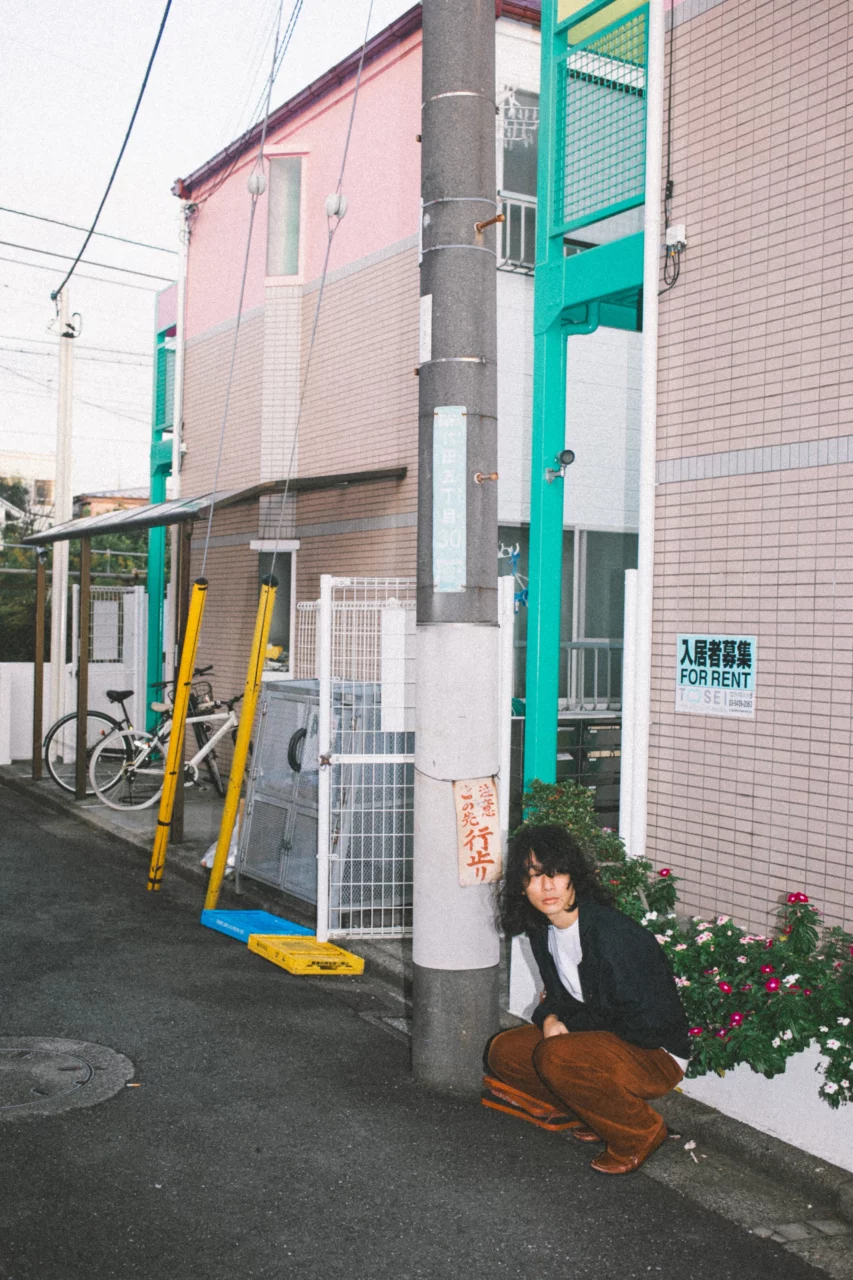
You mentioned earlier that you think in visual terms, and while you have experience working in television, you’ve chosen to express yourself through pop music rather than visual projects. Why do you think you chose pop music as your form of expression?
Ataku: The root of it comes from listening to Quruli and thinking, “I want to do this.” But it hasn’t been that long a journey in music for me. What was significant, though, is that my family has always been close. When I was a child, songs by Yosui Inoue and Yumi Arai (Yumiko Arai) would play in the car, and when I sang them back to my parents, they were so happy, and that made me happy too. Music playing in the car could connect two people, and I always thought that was what popular music was meant to do and that it was a wonderful thing.
So, you’d like your songs in daisansei to be sung by others or to be something that connects people, right?
Ataku: That’s what I hope for. Well, I do think, “It’s best if I sing them myself,” but still.
INDEX
Current Sentiment: “Let’s Begin, Moving Towards the End”
Listening to today’s conversation, I realized that you pay close attention to what you’re thinking at any given moment, and by turning those thoughts into songs, you move forward. Were you always this way?
Ataku: When I was younger, I just wanted to grow up quickly. It was tough. I wanted to quit the baseball club, but I was conscious of how others would see me and didn’t have the courage to leave. Being in the classroom was hard too; I was uncomfortable with how close everyone was, and I just kept thinking, “I wish this would end soon,” waiting for time to pass. I didn’t do much self-reflection, and I probably only thought, “I hope school ends soon” and “This food is delicious.”
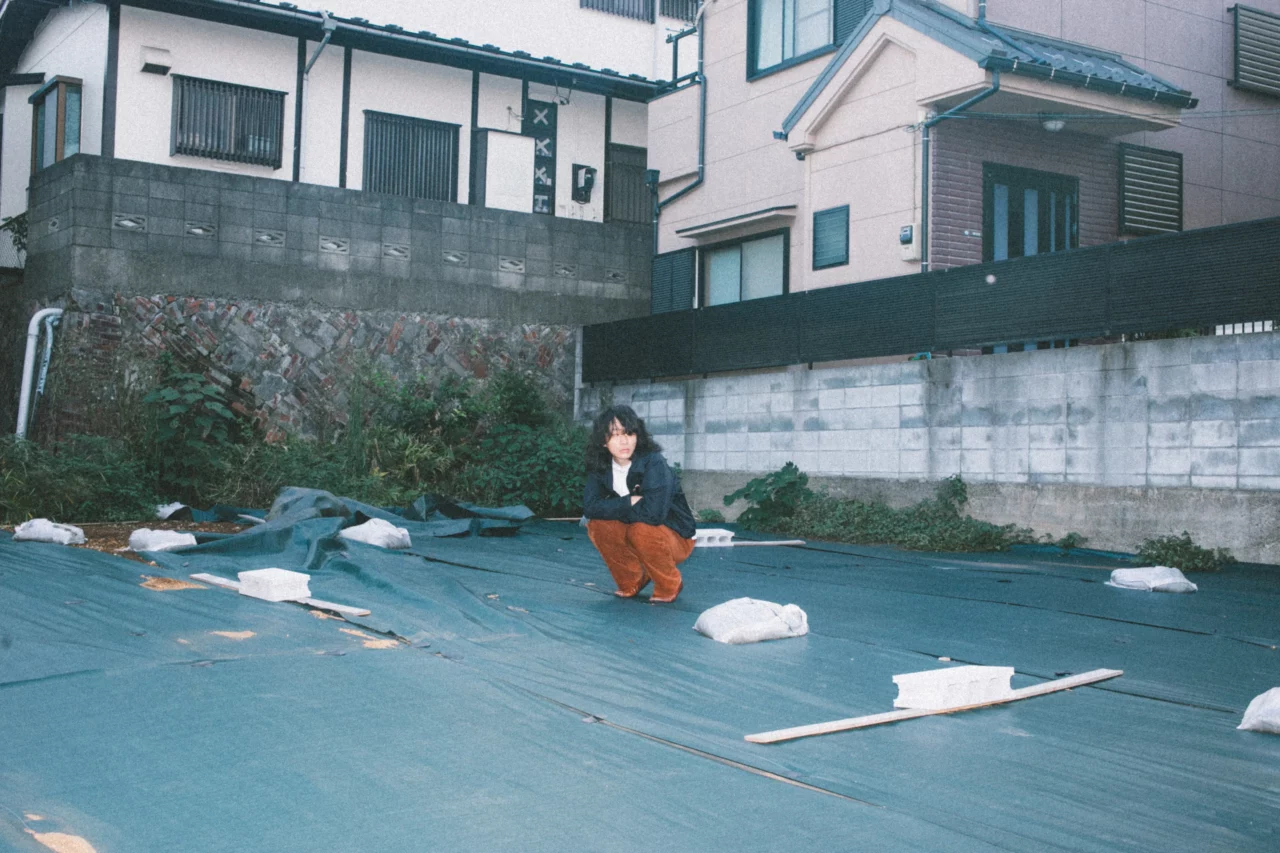
If there was a time in your childhood when you simply waited for things to happen, it feels like you might be seeking a different way of living moving forward. How do you envision your future life?
Ataku: I think I need to live more intensely. I feel like I’m already starting to see the end of my life approaching. With aging and everything, there may come a point where I can no longer mentally put myself in front of others. That might happen when I’m 36 or 37, or maybe after I turn 40, but whatever it is, I need to set an early end point for myself or I’ll find that I can’t do what I want. I need to rediscover what I want to do—not in terms of everyday life, but in my creative activities—and make it happen, make it successful, and bring it to an end. Right now, I feel like it’s all about starting with the mindset of “let’s begin towards the end.”
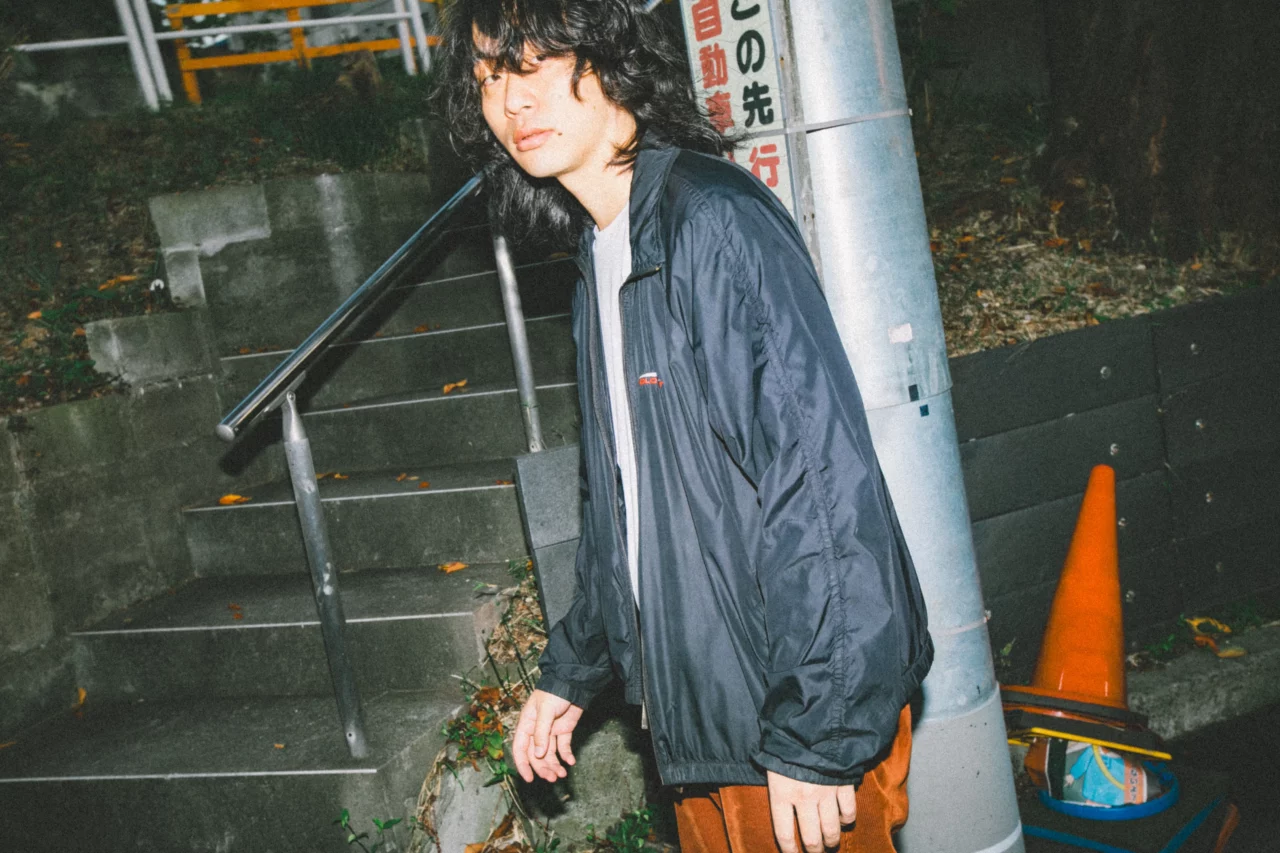
daisansei『before you leave』
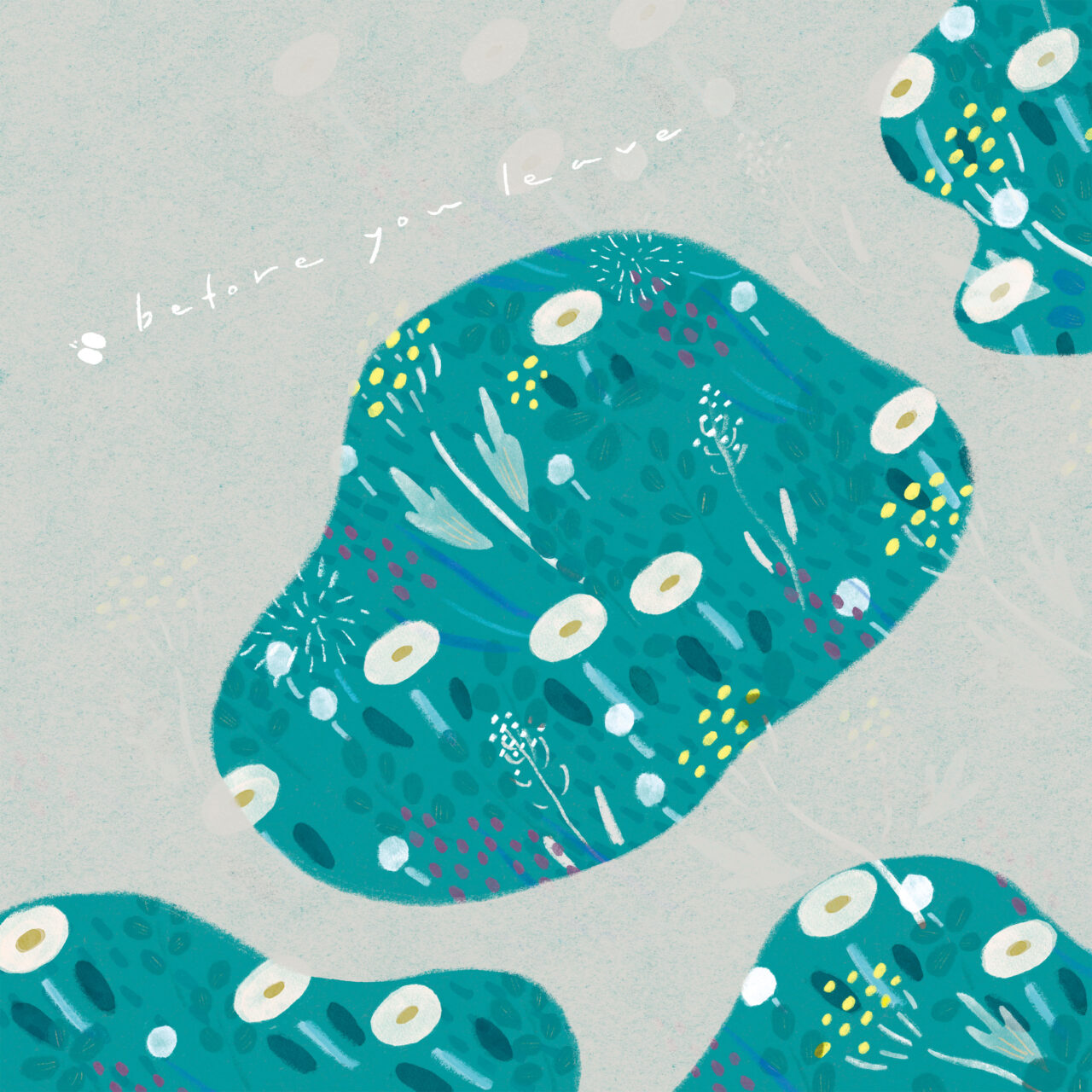
Release date: November 15, 2024 (Friday)
Format: Distribution/Subscription,CD
Price: 1,500 yen (tax included)
Item number: OZSKCD-1004
Released by Ozashiki Records
Included songs
1.Old Fashioned
2.before you leave
3.Bouquet Toss
4.How to thicken
5.in the cape
6.who is he
Distribution link: https://linkco.re/a39AgUxF?lang=ja
Daisansei’s Year-End Fluffy Tour
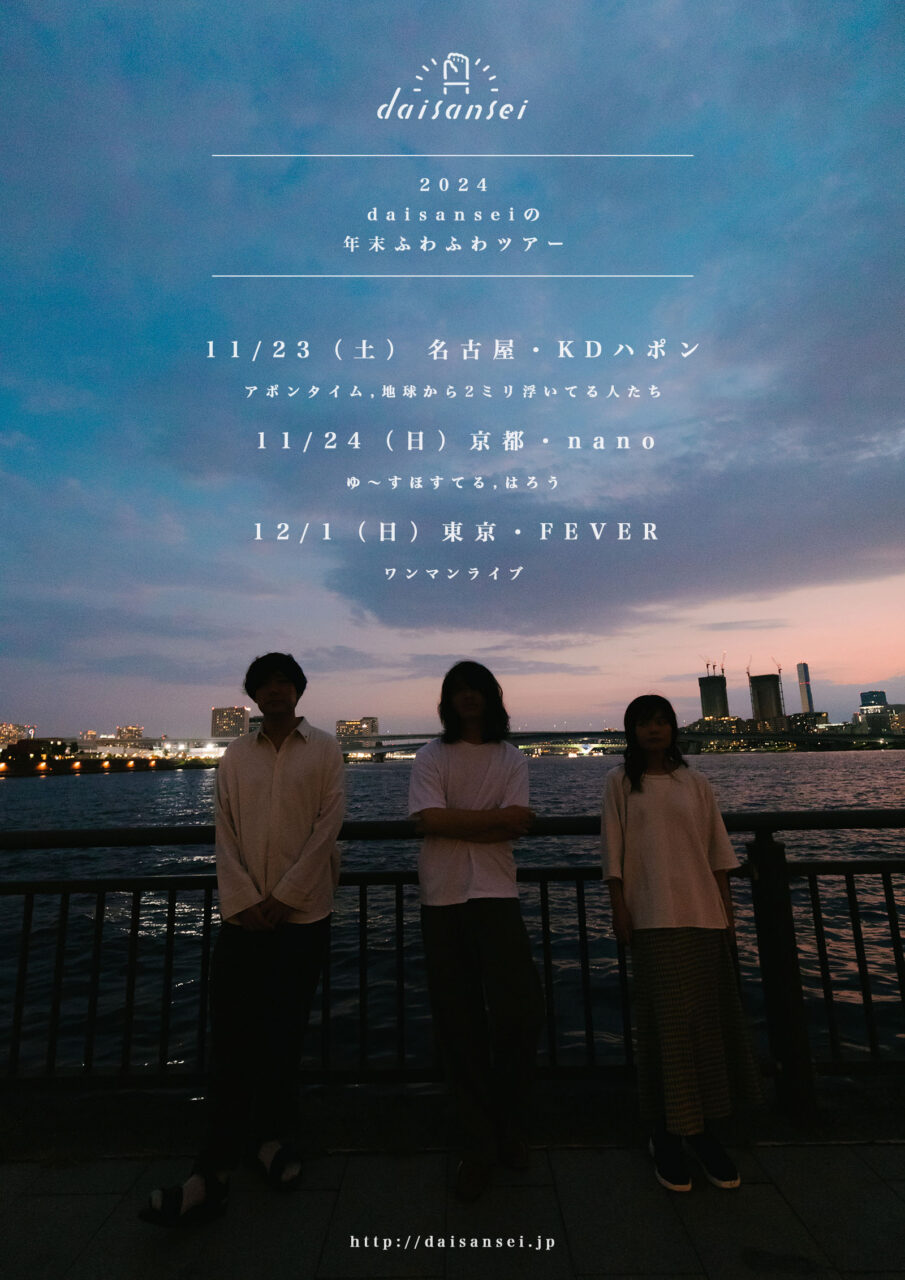
November 23, 2024 (Saturday) – “Daisansei’s Year-End Fluffy Tour, Nagoya Edition”
Venue: Aichi, Nagoya KD Japon
Time: Doors open at 18:00 / Show starts at 18:30
Tickets: Advance ¥3,000 / At the door ¥3,500 (plus 1 drink fee)
Performers: Daisansei, Apon Time, People Floating 2 Millimeters Off the Ground
Inquiries: info@daisansei.jp
November 24, 2024 (Sunday) – “Daisansei’s Year-End Fluffy Tour, Kyoto Edition”
Venue: Kyoto Live House nano
Time: Doors open at 11:30 / Show starts at 12:00
Tickets: Advance ¥3,000 / At the door ¥3,500 (plus 1 drink fee)
Performers: Daisansei, You’s Hostel, Hello
Inquiries: info@daisansei.jp
December 1, 2024 (Sunday) – “Daisansei’s Year-End Fluffy Tour, Tokyo Edition ‘Shin-Syodai FEVER Solo Concert'”
Venue: Tokyo, Shin-Syodai FEVER
Time: Doors open at 17:00 / Show starts at 18:00
Tickets: Advance ¥4,000 / At the door ¥4,500 (plus 1 drink fee)
Performers: Daisansei
Inquiries: VINTAGE ROCK std. 03-5787-5350 (Weekdays 12:00–17:00)
Website
Official Website: https://www.daisansei.jp/
X: https://x.com/dai_sansei
Instagram: https://www.instagram.com/dai_sansei/

















